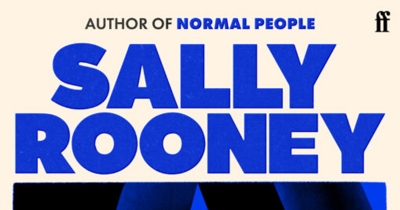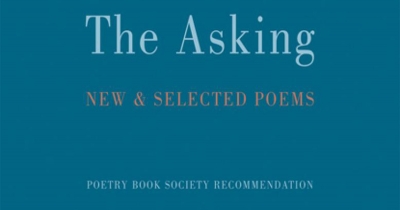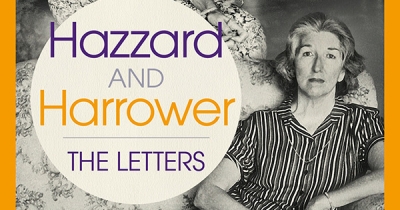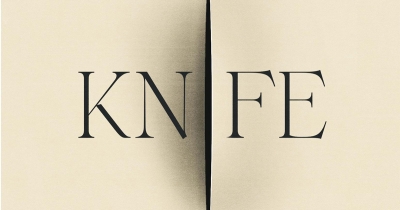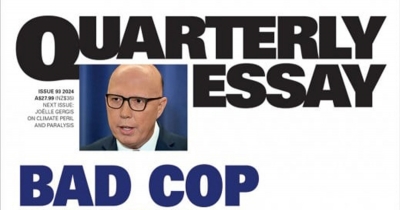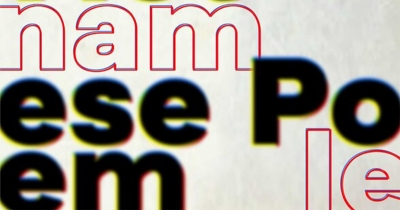Book of the Week
Sign up to Book of the Week and receive a new review to your inbox every Monday. Always free to read.
Recent:
Sally Rooney inspires large quantities of what is known these days as ‘discourse’. This dubious honour is a result of her becoming very successful at a very young age, a misfortune compounded by being cast as a generational representative. She is a ‘millennial’, apparently. Her popularity has not gone unpunished. There have been several high-profile attempts to cut her reputation down to size. She is also Irish, which has led to her being scorned as a privileged white woman, the Irish people famously knowing nothing of suffering and oppression.
... (read more)Protecting Indigenous Art: From T-shirts to the flag by Colin Golvan
In this important book, Colin Golvan – a distinguished senior counsel – recounts some of the most notorious cases of copyright abuses endured by Indigenous artists, their work taken without permission, attribution, or adequate compensation and used on objects ranging from souvenir T-shirts to expensive carpets. An intellectual property barrister, Golvan leads us through the intricacies of these cases with lawyerly precision and poise, championing the role of copyright in bringing justice to Indigenous people.
... (read more)Helen Garner has death on her mind. In recent decades, it has permeated her work in fascinating and unexpected ways. There is her novel The Spare Room (2008), which is about a woman’s struggles to care for a dying friend held hostage to dangerous delusions; This House of Grief (2014), a true-crime book about a devasting act of filicide; and, in her most recent volume of diaries, How to End a Story (2021), an account of the death of her marriage to the novelist Murray Bail.
... (read more)On Xi Jinping: How Xi’s Marxist Nationalism is shaping China and the world by Kevin Rudd
How does Xi Jinping think? China’s leader since late 2012 is one of the most important but least accessible people in the world. He does not give interviews. His lieutenants do not leak to reporters. His associates do not write tell-all memoirs. The Chinese Communist Party is a secretive organisation that dominates the country’s information ecosystem by censoring speech and crushing dissent. We therefore know precious little about how decisions get made in Beijing.
... (read more)The Forever War: America’s unending conflict with itself by Nick Bryant
It was a young Abraham Lincoln’s prediction that the United States ‘must live through all time, or die by suicide’. Nick Bryant wants us to believe the latter is coming true. America has been popping pills from the very beginning. Now the fatal overdose is inevitable. This time, we are reaching an ‘extreme polarization … 250 years in the making … a second civil war’. Rather than the hysteria for and against Donald Trump being an aberration, ‘the hate, divisiveness and paranoia we see today,’ Bryant argues, ‘are in fact a core part of America’s story’. It has been on this path since 1776; Trump is less a waypoint than a destination.
... (read more)Jane Hirshfield writes a poem on the first day of each year. ‘Counting, New Year’s Morning, What Powers Yet Remain to Me’ is one of the new poems in The Asking, along with poems selected from nine collections published since 1982. It begins with a question the world asks (‘as it asks daily’): ‘And what can you make, can you do, to change my deep-broken, fractured?’
... (read more)Hazzard and Harrower: The letters edited by Brigitta Olubas and Susan Wyndham
‘Everyone allows that the talent of writing agreeable letters is peculiarly female.’ So said Jane Austen in Northanger Abbey. Even allowing for Regency hyperbole, there is some truth in the sally. We think of the inimitable letters of Emily Dickinson, who once wrote to a succinct correspondent: ‘It were dearer had you protracted it, but the Sparrow must not propound his crumb.’ In 2001, Gregory Kratzmann edited A Steady Stream of Correspondence: Selected Letters of Gwen Harwood, 1943-1995. Anyone who ever received a letter or postcard from Harwood – surely our finest letter writer – knows what an event that was. She was nonpareil: witty, astringent, frank, irrepressible. Now we have this welcome collection of letters written by Elizabeth Harrower and Shirley Hazzard (unalphabetised on the cover, in a possible concession to the expatriate Hazzard’s international fame).
... (read more)The opening pages of Knife give an account of the attempted murder of Salman Rushdie at a speaking engagement in upstate New York on 12 August 2022. His assailant charged out of the audience and onto the stage, where he attacked the author, using one of several knives he had brought along, for exactly twenty-seven seconds. Rushdie is precise about that detail, which one imagines is rather a long time if you are being stabbed. By the time he was restrained, the would-be assassin had seriously wounded Rushdie’s left hand, punctured his torso multiple times, slashed his neck, and stabbed him in the right eye deeply enough to destroy the optic nerve.
... (read more)Bad Cop: Peter Dutton’s strongman politics (Quarterly Essay 93) by Lech Blaine
Bill Hayden might today be recalled as the unluckiest man in politics: Bob Hawke replaced him as Labor leader on the same day that Malcolm Fraser called an election that Hayden, after years of rebuilding the Labor Party after the Whitlam years, was well positioned to win. But to dismiss him thus would be to overlook his very real and laudable efforts to make a difference in politics – as an early advocate for the decriminalisation of homosexuality, and as the social services minister who introduced pensions for single mothers and Australia’s first universal health insurance system, Medibank. Dismissing Hayden would also cause us to miss the counterpoint he provides to Peter Dutton, current leader of the Liberal Party.
... (read more)Even in his first publication, the seven short stories of the rightly celebrated The Boat (2008), Nam Le was perhaps always most interested in creating an aura of violent unpredictability. He withheld consistency, offered cruxes, hit the reader with a blizzard of bold plots in settings so varied as to be practically contradictory – Hiroshima, Medellin, New York City, a fishing town on the Queensland coast. Where, as in the title story, Nam Le appears to relent and writes about what may have been his own experience (he was ferried to Australia as an infant), the baby dies. He is like a package determined not to contain what it says on the disclosure form; a letter that won’t be delivered to the stated address.
... (read more)


